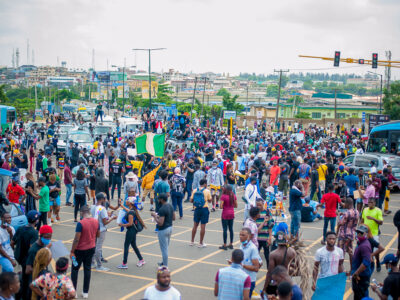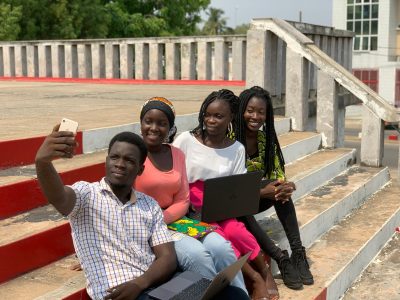
Global Voices (GV) is committed to amplifying traditionally marginalized voices from around the world. This extends to women, people with disabilities, Indigenous populations, people from the Global South, and young people. Those under 18 years of age make up over 29 percent of the global population. However, they are still routinely overlooked due to their perceived immaturity, inexperience, and overexuberance.
At Global Voices, we believe that young people have important perspectives to contribute to global discourse and debates. All around the world young activists and changemakers tackle complex problems to make tangible differences in their communities. Whether it is through protesting injustice, creating alternative information sources amid fake news epidemics, or finding creative ways to advocate for policy change in their communities, young people are often on the cusp of political and social change.
For some young people, this commitment to activism and change has led them to pursue careers as journalists. While they will eventually have access to platforms, as they study, they often have few spaces to voice their lived experiences, views, and challenges. In light of these inscrutable realities, Global Voices’ Young Voices series will offer our international, multilingual news platform to highlight the work of young people in our communities.
In the first edition of this series, we turn our lens to Lagos, Nigeria. Young people constitute over 17 percent (33.6 million) of Nigeria’s 200 million population. With a median age of 18 years, Nigeria is one of the most youthful populations in the world. Yet, 13.1 percent of Nigerian youth are unemployed. Nigeria’s federally funded public universities have been closed down since February 14, 2022, due to the “total and comprehensive” strike embarked by university teachers. The 2020 Nigerian youth-led #EndSARS protests, though primarily a movement against police brutality was equally an outrage against the general despondency in the country. Some these injustices still persists to date.
In partnership with the School of Media and Communication (SMC), Pan-Atlantic University (PAU) in Lagos, Nigeria, the Young Voices series will offer students an opportunity to address pressing issues in their communities — everything from female genital mutilation and political corruption, to city planning issues and food insecurity.
This initiative was conceptualized and made possible by Dr. Nwachukwu Egbunike, Global Voices’ Co-Editor for Sub-Saharan Africa and a faculty member at Pan-Atlantic University. Egbunike is using his teaching position, expertise in writing, and over a decade of scholarship and practice experience in digital rights, to engage his Nigerian SMC undergraduates as the initial Young Voices cohort. This is in line with PAU-SMC’s education philosophy, which encourages faculty to maintain industry engagement in order to be able to transmit both conceptual and practice-based education to their students.
The stories featured in this series cover a wide array of topics and angles, ranging from human interest stories, digital rights, and the tragic-comic complexities of daily life in Lagos. This mosaic gives a unique snapshot of what life is truly like for young people in Nigeria — a perspective and insight that is often overlooked in the global mainstream media landscape.
Find the stories in our Young Voices series below.
Stories about Young Voices: Nigeria
#FreeOurDaughters: ending Female Genital Mutilation in Nigeria
Nigeria is in the top three countries for FGM, which causes severe bleeding, urinal infections, psychological problems and complications in pregnancy for women survivors.
Reviewing three Nollywood movies that broke the mold
A review of Nigeria’s top movies: “Wedding Party,” “King of Boys,” and “Chief Daddy.” Nollywood films are now recognized around the world, paving the way for the new Nigerian cinema.
Why are Nigerians so quick to dismiss the mental health of adolescents?
Nigerian adults can be dismissive of the mental health of young people. Sadly, this only aggravates the situation, leading to severe consequences for the children.
The sweltering traffic congestion on the roads of Lagos in Nigeria
Driving in Lagos, it seems as though everyone is angry or mad. But fear not, soon enough, you notice yourself acting mad too.
Why the conviction of rapists in Nigeria has remained atrociously low
Nigeria’s unconvicted rape cases are becoming unbearable for its rape survivors, who are struggling to overcome their experiences.
Exploring Nigeria’s Yemisi Shyllon Museum of Arts
The Pan-Atlantic University, Yemisi Shyllon Museum of Arts — Nigeria's first university museum — by hosting the ‘Invisible Hands’ exhibition, provided a counter-narrative to the historical erasure of Nigerian women artists.
Nigeria deteriorates into a perilously insecure nation
Armed banditry, Jihadist terrorism, kidnappings, and sports-related violence all impact the safety and livelihoods of citizens across the country.
Nigeria’s Lagos gangs terrorize citizens, extort transport workers, and wreak havoc
Area boys (agbèrò) make life hellish for Lagosians. They tax cab drivers, peddle illicit drugs, collide with politicians as thugs and make life insecure with their numerous gang fights.
The ‘Ikorodu Bois’ demonstrate how digital platforms are amplifying Nigerian movies worldwide
With sparse equipment and digital tools, the ‘Ikorodu Bois’ crew created sensational and hilarious mimicry of Hollywood and Nollywood movies that has become a global social media sensation.
The aftermath of #EndSARS: The Twitter ban and what it means for young Nigerians
The nationwide #EndSARS movement against police brutality which took the country by storm in October 2020 demonstrated the power of digital media when used as a tool for advocacy.
#KeepItOn: How the Twitter ban is affecting young Nigerians
Twitter is a connected public square for many young Nigerians. The ban is taking a toll on their businesses, advocacy, and social life.
Social media became a life-saving tool for Nigerians. Now, they have to fight for it
The #EndSARS protest, the Twitter ban and the #June12 protests point to the power of social media in Nigeria. But a rattled government is bent on extinguishing that power.














